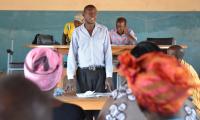Unprecedented cooperation helps strengthen human rights protection in Zambia

The poor and members of vulnerable groups in Zambia, especially women and children, face violations of their rights in a range of civil matters, often related to family life (for instance, discriminatory practices on women and various forms of child abuse) and property ownership (such as denial of property upon divorce, property grabbing at succession).
With support from the Danish Institute for Human Rights, the judiciary and the house of chiefs (a State advisory body to the Government of Zambia on traditional and customary matters) are working together in order to address this situation.
The Local Courts (first level of the judiciary) and customary courts (mainly composed of traditional leaders) are the only justice providers present at community level and settle the vast majority of civil disputes, primarily according to customary law. However, their relationship has for long been characterised by a lack of interaction and a sense of competition for cases and authority. This can often result in non-enforcement of Local Courts judgments as well as social pressures to discourage communities from using Local Courts.
“The judiciary and the house of chiefs took a landmark step to partner on issues of community justice, bridging the gap between Local Courts and customary courts and establishing a constructive and dynamic relationship between the courts based on mutual respect and active cooperation.” Karol Limondin, legal adviser at the institute, says.
Reconciling customs with human rights
Both the Local Courts and customary courts now facilitate access to their courts by creating a friendlier and less intimidating environment for court users, particularly the poor, women and children. These courts also take measures to reconcile customary law with the guarantees of constitutional and human rights. Impact on communities has been significant.
"For example, in a case of divorce, women's property rights are protected and courts will ensure that the property acquired during the course of the marriage is shared equally and fairly between the husband and wife," explains Charles Dinda, Zambia National Adviser at the institute.
He continues: “Similarly, the principle of the ‘best interest of child’ is taken into consideration when courts decide on child custody.”
These changes were made possible through legal capacity development for the judiciary and customary courts, combining joint training workshops, new reporting and consultation mechanisms on casework, and the development of practice guidelines, tools and handbooks to assist courts in handling disputes. Institutions and individuals consult teams of community facilitators wherever a particular justice issue arises at community level. Paralegals are also part of the process, as they are instrumental in reaching out to communities, raising awareness, providing legal information, advice and mediation, following-up on human rights issues, and fostering the development of links between Local Courts and customary courts.
Promoting collaboration and cooperation among justice providers
Stakeholders also put special focus on developing collaboration.
“Local Courts are our first stakeholders and traditional leaders are now willing to work with the Local Courts and their supervising officers. We are now looking forward to improving our performance so that the contribution made by traditional leaders and customary courts in Zambia will be recognised by everyone and all institutions and government,” Chief Chikanta, from the southern province in Zambia, emphasises.
This trend led to the setting-up of networking structures at community level, in particular the ‘Community Justice Boards’ (CJBs). These boards constitute an innovative channel for the judiciary, customary courts, paralegals, the police and other relevant stakeholders such as social services and health centres, to meet on a regular basis and coordinate interventions in their respective communities. The CJBs allow for experience sharing, mutual learning and accountability, thereby contributing to improve justice delivered to communities.
- Removal of barriers faced by communities in accessing the judiciary and customary courts
- Improved professionalism of Local Courts and customary courts
- Collaboration, information sharing and referral services between the judiciary, customary courts and paralegals
- Development of customary law consistent with human rights
Moving towards expansion and policy development
The model for cooperation on community justice was tested successfully in two provinces in Zambia with eleven participating Local Courts handling in total more than 7,500 cases per year, and customary courts based at village and chief levels in ten chiefdoms. All partner institutions would like to scale it up to the rest of the country, which represents over 500 Local Courts handling more than 120,000 cases in a year, and 286 chiefdoms.
“Justice in Zambia must reach out even to the remotest parts and to the poorest of the poor in the communities. This can only be achieved if all justice providers work in a collective and coordinated manner as we are all pursuing the same goal,” Mrs. Agatha Chipende, Chief Local Court Officer at the judiciary, says.
In 2015, the Danish Institute for Human Rights supports the judiciary and the house of chiefs in developing national guidelines for customary courts when handling disputes, as well as strategies at the judiciary for the longer-term institutional development of the Local Courts. DIHR also contributes to facts-based policy dialogues on the development of civil and customary justice in Zambia, gathering all relevant ministries and stakeholders at national level. The institute collaborates with CSOs engaged in training of Local Courts, chiefs and traditional leaders on human rights and community justice.
The Danish Institute for Human Rights’ work in Zambia is sponsored by the Danish Ministry for Foreign Affairs.
